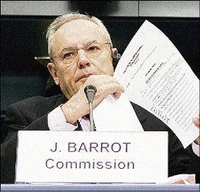First-class and second-class Caricom citizens?
Published: Sunday | February 22, 2009

Norman Girvan
I must confess to being conflicted by the news that Schengen visa requirements are soon to be lifted for four Caricom countries (as reported on the Caribbean Netnews website). Like many others who have had to apply for a Schengen visa for even the shortest of visits, I find the procedures onerous, intrusive and demeaning.
So I cannot, but be happy for those citizens of Antigua and Barbuda, the Bahamas, Barbados and St. Kitts and Nevis who will henceforth not be required to endure them if they wish to travel to Schengen zone countries.
One the other hand, I wonder whether the measure is not a further step towards the establishment of first- and second-class citizens, and even of first- and second-class countries, within Caricom. There is a sense in which such a situation already exists de jure with respect to Haiti (whose citizens are required to have visas to visit many other Caricom states) and de facto with respect to Guyanese, who are regularly hassled when attempting to exercise their Treaty rights to travel freely within the region.
Notably, the four visa exemption countries are among the smallest and the richest members of Caricom. Their combined population of just over 750,000 is only five per cent of Caricom's total population (and about 0.15 per cent that of the European Union (EU)). And their average per capita income is three and half times the Caricom average ($14,700 compared to $4,220, purchasing power parity 2000 dollars). This puts the four well ahead of the EU's poorest members - countries like Lithuania, Latvia, Bulgaria and Romania.
Poverty and unemployment in the four are also low - they are all probably net importers of labour. Clearly, there is no risk of the EU being 'flooded' by job-seekers from these islands.
lifted visa requirements
In return, the four countries have lifted visa requirements for nationals of all EU states, including several of the EU's newer members that are former Soviet bloc countries. The European Commission can now boast to these newer members that it has put them on a 'level visa playing field' with the older members. Good bonus, little onus.
The problem, of course, is that this makes the playing field even more unbalanced for other Caricom countries. Ironically, by granting the exemption to a select few within Caricom, the EU is introducing the very kind of distinction within Caricom that it is seeking to abolish within the EU itself.
Consider the following (hypothetical) example. Mrs Brown, a lawyer from Dominica, has been living and working legally in Antigua for several years. She may have a work permit, or a Caricom Skills Certificate, or she may be a legal resident - it doesn't really matter.
Mrs Brown plans to take a vacation in the UK and, while there, hopes to take a side trip to Paris. To do so, she will have to obtain a Schengen visa. She will have to answer questions that 'prove' that she has a secure and well-paying job in Antigua, when she plans to arrive in France, by what means and in what port of entry, when she will leave, provide documentary evidence of her means of support while in France, the name and address of her host or host company in Paris, etc, etc. On top of that, she will be required to take out medical insurance to cover the duration of her stay - even if it's only for a weekend.
favoured countries
However, all this will not apply to Mr Jones, the Antiguan taxi-driver who takes Mrs Brown to the airport. Mr Jones will be able to simply buy a ticket and spend up to three months legally in France without anybody asking him any questions.
As there are thousands of Caricom citizens living and working legally in Antigua and Barbuda, The Bahamas, Barbados, and St Kitts and Nevis, this scenario can be multiplied several times and in countless variations and permutations (for example, where Mrs Brown is married to an Antiguan, and her children are Antiguan, etc). And of course, it applies en masse to the 11 other Cariforum countries which are not so favoured.
From the point of view of EU visa regulations, therefore, we can see the emergence of first-class and second-class Caricom/Cariforum citizens - and first-class and second-class Caricom/Cariforum countries.
If the UK joins the Schengen zone - as it is reported to be considering - the distinction will become even more real to the ordinary citizens of Caricom. The majority will be required to secure Schengen visas to visit the UK. A privileged few will not.
another side
There is another side to this. When the pros and cons of the EPA were being debated last year, some of us pointed out that the right of Cariforum countries to export services to the EU - an alleged benefit of the agreement - was significantly qualified by the visa and immigration restrictions that would still be maintained by EU member states.
Lifting of Schengen visa requirements for four countries will place their service providers at a distinct advantage vis-à-vis those from the 11 other Cariforum states.
They will be able to make casual visits and to scout out opportunities for landing contracts to sell their services under the terms of the EPA; without the hassle of getting a visa beforehand .
There will still be other barriers to be overcome; like certification requirements, mutual recognition arrangements and the possibility of economic needs tests being applied by destination countries. Nonetheless they will have 'foot in the door'.
The visa exemption agreement, in other words, strengthens the likelihood of establishing first-class and second-class 'country beneficiaries' as a result of the operation of the EPA.
Could this be a reason why some Caricom countries, with an interest in the export of services to the EU, were much more enthusiastic about signing the EPA than others? At the time that the EPA was being debated, the visa exemption negotiations were well advanced.
wide differences
The EU, of course, will argue that it cannot afford to allow free travel access to the whole of Caricom/Cariforum, because of the wide differences in living standards between the two regions; and the possibility of illegal stay-overs.
There is a glaring double standard, however, in the fact that the EPA will force the countries of the region to open the majority of their markets to imports of European goods, and to allow in employees of European firms, while Europe continues to maintain tight restrictions on the inflow of Caribbean labour and casual Caribbean visitors.
One may also ask why, after centuries of colonial rule, and of European investment in, and trade with, the Caribbean, wealth is so heavily concentrated on one side and poverty on the other. Europe, I suppose, bears no responsibility for this state of affairs.
The EU will also point out that within Caricom/Cariforum, visa restrictions are maintained against Haitians; and that The Bahamas is not a member of the CSME because it does not wish to subscribe to the free-movement obligations.
True enough. And the discrimination that Haitians, Guyanese and other Caricom nationals suffer in other Caricom states should be energetically condemned and opposed wherever it raises its ugly head.
At the same time, there is world of difference between the absorptive capacity of a country with fewer than 300,000 people and that of a continent of 500 million.
At any rate, the claim of Vice-President Jacques Barrot, European commissioner responsible for justice, liberty and security, that the exemption agreements show that Europe is sometimes unfairly called 'Fortress Europe', hardly seems to stand up to scrutiny.
Far from breaching the walls of Fortress Europe, the visa exemptions merely extend the perimeter of the fortress by a few centimetres to facilitate tourism. Limited access for tourism has been provided to six small, relatively prosperous island states with a combined population that is 0.6 per cent of the EU total. (Mauritius, population 1.3 million; and The Seychelles, population 82,000; have made similar agreements).
The barriers against the rest have, accordingly, been underlined.
In the evolving system of 'Global Economic Apartheid' (the term is Fidel Castro's) the Schengen visa and their British, US and Canadian versions have become the international equivalent of the infamous 'Pass' that black South Africans were required to have in their possession when travelling to whites-only areas.
"Don't leave home without it, kaffir, or you will be in big trouble."
It was Bob Marley who longed for the time when "there are no longer first-class and second-class citizens of any nation". He could have been talking about the world community.
Until that day, Marley predicted, there will be "war".
Norman Girvan is Professorial Research Fellow at the UWI Graduate Institute of International Relations at the University of the West Indies in St Augustine, Trinidad and Tobago.

Jacques Barrot -Reuters
Feedback may be sent to norman.girvan@sta.uwi.edu or columns@gleanerjm.com
